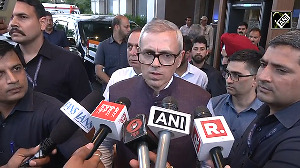Before you buy a cashless benefit plan at lower premiums, check if you can make full use of it.
Most don't even exhaust the entire benefit, says Tinesh Bhasin.

Illustration: Dominic Xavier/Rediff.com
Till recently, health insurance plans that offered reimbursements for a doctor's visit had much higher premiums compared to policies that don't. But things have started changing.
Recently, some insurers have launched plans that offer outpatient department (OPD) benefits at a lower cost. Some even made the reimbursement cashless.
"Insurers have been able to bring down the cost of OPD and diagnostics as they now have an established network of doctors and diagnostics chains. Earlier, they depended on customers to submit bills and there was no way to know if those were genuine," says Mahavir Chopra, director-health, life and strategic initiatives, Coverfox.com.
The premiums for new plans that come with OPD and diagnostic benefit are still higher than of, say, a basic policy. But these also offer many additional features that can help policyholders in the long run.
There could be wellness benefits or lower wait period for pre-existing diseases.
Experts suggest individuals opt for plans with OPD benefits if they can make full use of the other features.
If you already go for a walk regularly, for example, go for a plan with OPD benefit that also offers discounts on walking a certain number of steps.
"Also, check whether doctors and diagnostic chains in the insurer's network are convenient for you to access," says Naval Goel, founder and CEO, PolicyX.com.
Options on offer
Max Bupa's GoActive not only covers doctor consultations and diagnostics but offers discounts up to 20 per cent on premiums for achieving pre-set health goals.
The number of doctor consultations vary depending on the sum insured.
A policy with a Rs 1 million cover offers 10 free consultations, while a Rs 500,000 plan offers six free visits.
In a family floater, any member may use the benefit repeatedly until the limit is exhausted.
Similarly, the diagnostics are capped at Rs 2,000 for a plan with Rs 500,000 cover and Rs 3,000 for a plan with a Rs 750,000 sum insured.
"We also offer a whole lot of other features like health coach, behavioural consultation on call and 10 per cent lifelong discount if a person below 35 years buys the policy," says Ashish Mehrotra, MD and CEO, Max Bupa.
Apollo Munich has launched a policy called Health Wallet. Under this, there is a reserve benefit feature.
Depending on the sum insured, customers get an additional cover that they can use to pay for OPD, diagnostics, AYUSH treatment, etc.
"If the customer doesn't use this cover, it carries forward to subsequent years. The policyholder also keeps getting six per cent annual interest on the reserve benefit that they keep carrying forward year after year," says Bhabatosh Mishra, COO, Apollo Munich.
An individual gets Rs 5,000 as reserve in policies with sum insured of Rs 300,000 and Rs 500,000.
The reserve increases with the cover, and the maximum offered is Rs 25,000 in a Rs 5 million policy.
ICICI Lombard offers OPD benefit under its Complete Health Insurance plan which is a comprehensive family floater policy that has a wellness programme, free health check-ups, AYUSH treatment, and so on.
The OPD benefits are linked to the sum insured and go up to Rs 20,000 in policies having cover of Rs 1.5 million, Rs 2 million, Rs 3 million and Rs 5 million.
So, what's new?
Insurers are tying up with chains that are backed by corporates or partnering with start-ups to offer the benefits.
They can now have complete control on the process and don't rely on the consumer to provide bills and other documents.
ICICI Lombard and Max Bupa, for example, have tied up with Practo to offer cashless doctor consultations.
Earlier, the companies only had the option to reimburse the customers, based on the bills they submitted.
Many therefore charged extra premiums equivalent to the OPD benefit. Say, a basic policy with a sum insured ofRs 500,000 lakh had Rs 10,000 premium.
If OPD benefits of Rs 5,000 were offered, the company charged an additional Rs 5,000 to Rs 6,000 premium. Many customers went for it as they got income tax deductions.
Check your doctor's expenses
Experts say most families don't even exhaust Rs 5,000 OPD and diagnostic limits in a year.
"Before you buy a plan, check if you can make full use of it. Most don't even exhaust the entire benefit," says Dhruv Sarin, head of health, Policybazaar.com.
Industry sources point out that the average utilisation of OPD has been 60 per cent of the benefit offered.
While the insurers and their partners are expanding the network of doctors and hospitals, check whether you can access them easily.
Experts say that most people don't make full use of the feature if they have to travel some distance.
What if prices reduce in future?
Over time, the premiums for policies with OPD and diagnostics have been coming down. There's also a possibility that your insurer launches a new policy with additional features at a lower or same premium for new customers.
What are your options in such a case?
When the policy is due for renewal, insurers allow customers to shift to a new policy on 'as is basis'.
"The process is similar to porting of health insurance. You can opt for the new policy and there won't be any health check-ups for the same sum insured," says Mishra of Apollo Munich.
"If you, however, demand an increase in the cover, the insurer may ask you to go for medical tests," Mishra adds.
Otherwise, the policyholder needs to pay only the differential premium.








 © 2025
© 2025